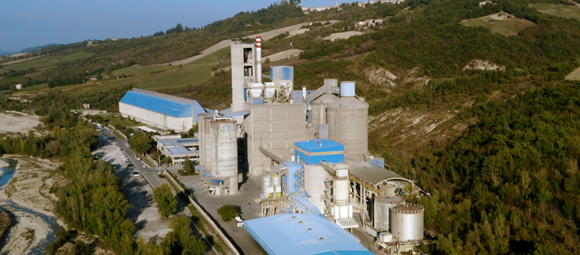
From Cleanker to Herccules: Buzzi Unicem's contribution to the capture and storage of carbon dioxide
During 2022, Buzzi Unicem unveiled the roadmap "Our Journey to Net Zero," which outlines the measures needed to achieve ambitious CO2 reduction targets by 2030, leading to full decarbonization by 2050. Carbon Capture Utilization Storage (CCUS) technologies are a key lever to complete the emissions reduction framework. At this stage, Buzzi Unicem is actively engaged in the testing of several pilot-scale CCUS technologies.
The first results of CLEANKER (CLEAN clinKER production by calcium looping process), a project launched in 2017 and funded by the European framework program Horizon 2020, were recently presented. The project featured the development of the first Italian prototype of CO2 capture and storage in the context of an operational business process, at the Buzzi Unicem plant in Vernasca (Piacenza).
Cement is manufactured from the so-called "clinker," a material obtained by firing at high temperature a mixture of raw materials consisting mainly of limestone (calcium carbonate), which when heated to high temperatures naturally breaks down into calcium oxide and carbon dioxide in the process of decarbonation. With Calcium Looping technology, it is possible to make cement while capturing more than 90 percent of the carbon dioxide generated. Thanks to the CLEANKER project, an estimate has been made of the changes and investments needed in existing cement plants and their operating costs, validating the economic viability of the technology capable of capturing CO2.
After completing the Cleanker experience, Buzzi Unicem joined with equal enthusiasm the budding initiative called HERCCULES (Heroes in Southern Europe To decarbonize industry with CCUS).
Coordinated by LEAP (Laboratory of Energy and Enviroment Piacenza) and the Polytechnic University of Milan, the research project has involved 22 other international partners together with Buzzi Unicem, who for five years will work with the aim of proving the feasibility of the entire Carbon Capture, Utilization and Storage (CCUS) supply chain in Southern European regions. The 70 CCUS projects at different stages of development are in fact, concentrated almost exclusively in Northern countries.
The testing, which will again involve the Vernasca plant, is based on advanced oxy-combustion and post-combustion capture technologies combined with cryogenic purification processes capable of separating CO2 with efficiencies and purities close to 100 percent. Part of the pure CO2 stream will be used for mineralization for the production of new cementitious materials.
Activities will also include transport of CO2 to the Ravenna geological storage site, completing the demonstration of the entire supply chain. By capturing biogenic carbon dioxide and reusing and/or storing it, HERCCULES aims to show the possibility of achieving negative emissions, turning industrial clusters from emitters to absorbers.

